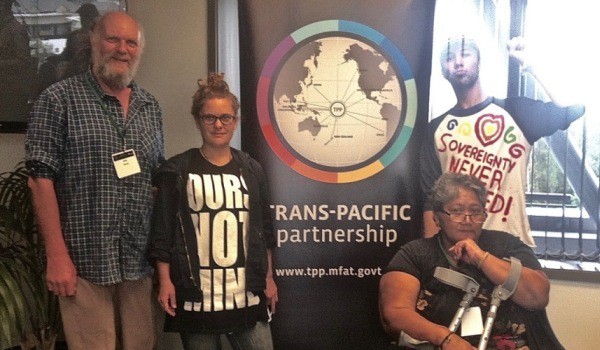By John Lawson
On Friday 6th May, the Trans Pacific Partnership (TPP) Roadshow finally reached Hamilton, months after it got on the road, and way too late to inform people for the very limited ‘consultation’ on TPP. Having little publicity and being at a time when most people were working, it was poorly attended. However, four protestors from Raglan made it through the Big Brother security to the unsignposted venue, as did several others, who made up most of the audience and were the only ones asking questions.
Security was clearly a concern for the Ministry. Not only did bookings close days before the event, but everyone had to agree not to cause trouble and that anyone could be expelled without reason. The ticket then issued gave no information about which of the 5 gates to use at the rugby ground, nor which room was to be used. Two police officers were at the entrance gate and remained for the whole show. Beyond the entrance gate there were two other checkpoints and a bag search, before entry to the Roadshow was permitted.
The Roadshow started with a lengthy speech by a top civil servant, MFAT’s (Ministry of Foreign Affairs and Trade) deputy secretary, David Walker (New Zealand’s chief negotiator in the TPP talks). He emphasised TPP’s benefits and glossed over the drawbacks. After that the best part of the show was the coffee and cakes, though, packed with sugar, caffeine and dairy products, some commented that, like the TPP, they might be good for trade, but not health.
Next came questions. Radio Live talkback host, Sean Plunket, who chaired the meeting, couldn’t resist making a few dismissive comments as speaker after speaker exposed TPP’s flaws.
One of the Economics lecturers at Waikato Uni questioned the economic justification for the TPP.
One of the Raglan contingent, John Lawson, said he didn’t understand why David Walker had said the TPP would allow governments to continue protecting health, yet had said there was a special provision to stop tobacco investors taking them to the disputes tribunal. John asked why the exception didn’t extend to other health threats, such as alcohol. Even Sean Plunket indicated he thought David Walker’s response was lame, when he said the TPP governments had decided tobacco was worse than alcohol.
The direct health effects of tobacco are probably worse than alcohol, but alcohol causes many other problems. However, the view of governments that they needed special exemption for tobacco, is a strong indication that investors will take governments to tribunal on nearly everything else. As with tobacco company, Philip Morris, they might not win, but even just holding legislation up for a few years and instilling fear into governments, might be worthwhile.
The Roadshow came the day after the Waitangi Tribunal found that the Treaty of Waitangi clause in the TPP should provide a reasonable degree of protection to Māori interests, though it may have “a chilling effect” on the Crown’s willingness to meet Treaty obligations. The Tribunal suggested that this issue, and an appropriate Treaty clause for future trade agreements, should be the subject of further dialogue between Crown and Māori. So another Raglan activist made the point that, “The clause will not protect Māori rights because the Crown decides whether there are possible breaches and, seeing the Crown are responsible for every other breach that has occurred to date, its rather like the Crown being judge in its own court.”
In concluding, David emphasised how long it would take to get legislation through. No doubt in the run up to the 2017 elections, that will be the focus of further protests. An opinion poll in August found 22.9% supported TPP, but 31.3% opposed it, so both sides will be aiming to reduce the 45% with ‘no view’. So expect to see more publicity!
